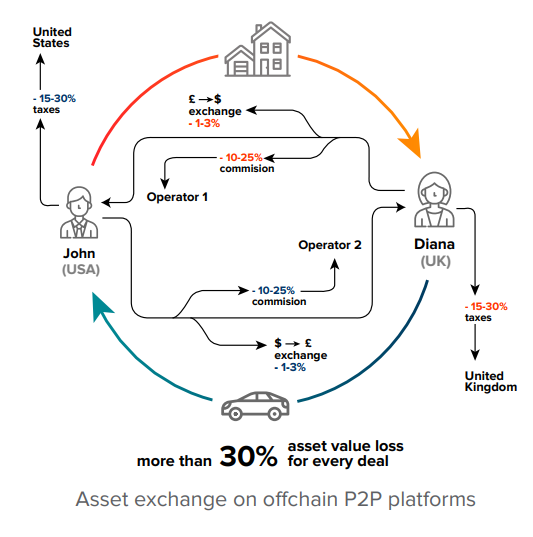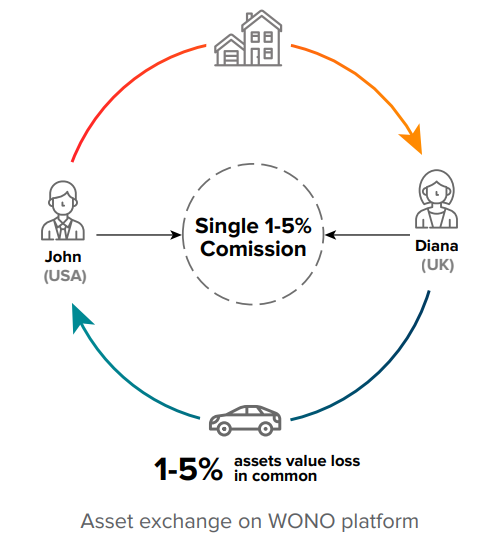
Introduction
To readers who are new to the world of blockchain and cryptocurrency, blockchain technology distributes information in a public ledger across a network of computers. Anyone with internet access can view and verify the information or contribute to its maintenance. Once transactions are registered on the blockchain, they are locked in and cannot be tampered with. Consequently, blockchains solve the problem of trust in transactions by storing information in a decentralized, immutable and transparent ledger, a role that was previously reserved for centralized authorities like banks.
In the wake of the digital revolution, there have been disconcerted efforts by traditional brick and mortar companies to implement digital transformation strategies. This trend may be inspired by the fact that fortune 500 company list is dominated by technology and telecommunication companies, most notably Amazon, Facebook, Apple and AT&T. ICT technology enables businesses to operate efficiently, innovate and provide better customer service. This is powered by artificial intelligence, cloud computing, Internet of Things and most recently Internet of Value. These innovations enable businesses to increase consumer engagement, service delivery and cross platform cooperation. As such, the value of digital platforms is set to grow as the world ushers in the digital era.
In the context of digital innovations, blockchain technology has the most potential in ushering in new progressive economic and social systems. For example, blockchain technology is shaping the emerging Internet of Value by catalyzing the efficiency in digitization of value and its transferability through the internet. Additionally, the decentralized model of operation achieved through distributed leger technology rewards ecological contributors equally, based on their level of input. As such the benefits of value creation that were previously hogged by intermediaries are returned to their rightful owners; the value creator. This can have a positive impact on the existing social structure by increasing the minimum wage of low income earners.
Blockchain technology can benefit the sharing economy
Among the digital companies, sharing economy platforms have experienced the most noticeable economic boom in recent years, best exemplified by the successes of TURO (car rental ) UPWORK (freelancing) AirBnB (home rental) and Uber (car rental). This boom is driven by the economic advantages that sharing economy modus operandi has over the business to consumer (B2C) companies. Firstly, the sharing economy peer to peer transactions are cost effective and flexible. Buyers can gain temporary access to services or goods with potential monetary savings. Sellers are able to monetize idle resource capacity which provides additional income while reducing operational costs. Despite their popularity and proven success, the existing platforms and the sharing economy as a whole has a number of weaknesses which can be optimized to establish a more inclusive and profitable sharing economy.
the infographic below illustrates the key weaknesses of the sharing economy

- High operational costs
Platform commission fees in the existing sharing economy models fees range between 10-30 percent of the transaction value. These high commisions eat into the vendor profits while adding to the buyer's costs.
Secondly, the traders have to contend with currency exchange costs when executing international trades. As citizens, entrepreneurs are also subject to taxes. Although taxes are a legal necessity, they eat into the traders' profits.
Lack of trust
In existing platforms, there aren’t sufficient measures to ensure deals go through. In case of fraudulent deals, there are little or no compensation mechanisms for victims, beyond retaliatory bad reviews on the perpetrator's profile. Ratings and reviews on centralized platforms are not fully transparent, as they can be manipulated by people with higher level access.Monopolization
Monopolization has three detrimental effects on the sharing economy. Established entities hog the economies of scale and deter entry to other players. Secondly, users are not fairly rewarded for their contributions since profits made by the platform are retained by the platform host. Lastly, branding and specialization in niche markets result in fragmentation of the sharing economy. Users have to hop in between platforms to gain access to different services or goods.
What is WONO?
WONO is an Etherium based platform that utilizes Etherium smart contracts and Interplanetary File System (IPFS) to enables users to exchange or rent assets and services without currency or taxation expenses. WONO was conceived to address the weaknesses of the sharing economy such as monopolization, lack of trust and high commision fees.
Roles in the WONO network
Users of the WONO platform have been categorized into Customers, Vendors, Guarantors and Arbitrators.

Customers
In the WONO network, customers fit the description that we are accustomed to in everyday life. They are users who pay for goods and services from assets owners through the wono platform.Vendors
WONO combines aspects of gig economy and sharing economy. As such, vendors will perform tasks or rent assets to buyers . Vendors will receive payments in WONO tokens via smart contracts when their deals with the customers are fulfilled.Arbitrators
Arbitrators are neutral parties with voting rights. In case any dispute arises between buyers and sellers in the platform, arbitrators examine the case and vote to determine the outcome of the case. Offending parties are fined whereas the offended parties will be compensated. To ensure non partial arbitration, arbitrators are required to stake tokens before voting. If arbitrators vote fairly in line with the majority consensus on a case, they will gain back the initial tokens they staked plus a bonus tokens which come from the insurance pool which is funded by part of the platform fees. If the arbitrator votes unfairly, they will still get back their staked coins, but with no bonus reward. It is presumed that the scheme will deter ill players as they have nothing to gain from making unfair judgements. This arbitration mechanism is projected to result in fair and high quality arbitrage within the platform.Guarantors,
Guarantors play an important role in the WONO ecosystem. Longterm residents of the crypto world may be more familiar with the term “escrow”. For the blockchain beginners, the concept of guarantors on blockchain platform is similar to their real world definition, the only difference is that their role is guaranteed by smart contracts. In the WONO platform guarantors stake their tokens and are thereafter charged with the responsibility of ensuring a deal is successfully concluded. If the deal goes through, the guarantor is reimbursed his staked tokens plus a bonus from the insurance pool of the transaction.
Services in the WONO platform
- Space sharing: WONO combines P2P rentals (e.g., Airbnb) with the home-swapping
concept; - Transportation sharing: WONO uses the Turo/Getaround model where a person can hire
or rent out a vehicle for any desired duration; - Miscellaneous assets sharing: Users can hire and rent out any assets in their
possession (e.g., gym memberships, gadgets, instruments); - Services sharing: WONO combines the Freelancer/Upwork model for remote jobs and
TaskRabbit for micro jobs.
WONO platform commission fees will range between 1-5 %. These low rates translate to higher profits for the buyer, and lower product costs to the seller.
The significance of the WONO token
The WONO token is the internal currency of the platform that is used to pay for transactions. It also serves as insurance for arbitrage purposes.
In an article published on Medium, Andrei Chepelev, COO at WONO explains the significance of issuing their own native token, rather than using the already established cryptocurrencies like Etherium. He argues that the token holders are equivalent to shareholders, which enables them to build a proper working decentralized platform. As shareholders, users will be incentivized to contribute to the growth of the platform in order to increase the value of their holdings. In addition to holding stakes in the platform, the token can be spent and earned.
To summarize WONO will;
- Enable the digitization of real world assets, by offering cryptocurrency as a means of storing and transferring value between entities in the freelance and sharing economy sector.
- Facilitate the redistribution of income value equally among ecological contributors i.e asset owners, service providers and community members
- Foster trust by leveraging the transparency and immutability of blockchain technology I deal transactions
- Reduce the costs of cross border transactions by eliminating currency exchange fees or the need to travel in order to secure deals with international trade partners
- Enable users to lawfully avoid taxes by using WONO tokens if they are retained within the platform.

Currently, WONO is crowdfunding to raise the capital to ensure the platform is successfully implemented. The infographic below has the details of the ongoing token sale.

TAKE AWAY
As human beings, our actions and situations change so that we are unable to operate with the mechanical precision of computers, which means a functional sharing economy can not rely on smart contracts alone.
On the demand side, customers have a growing dissatisfaction with how the existing sharing economy allows fraudsters to circumvent the security systems, a situation that birthed "when you order it online vs when it arrives" meme.

On the supply side, as a freelancer, the first on my priority list would be a platform that has a foolproof arbitration mechanism. From experience, human nature is fickle. What if the customer claims the conditions of the deal were not met even though they were?
WONO has recognized the need to retain intermediaries in the ecosystem, but not in authoritative profiteering positions. Instead, they make ecological contributions to the system as arbitrators who handle trade disputes, and guarantors who insure against fraudulent cancellation of deals.
After the successful implementation of the WONO platform, vendors and customers will benefit from a foolproof arbitration system, efficient and low cost transactions, transparency and equal distribution of value among ecological contributors.
You can learn more about WONO by joining their active online communities. I have included the relevant links below:
Website
Whitepaper
Telegram


Thank u for information
Downvoting a post can decrease pending rewards and make it less visible. Common reasons:
Submit
Sounds a nice topic.
Downvoting a post can decrease pending rewards and make it less visible. Common reasons:
Submit
Congratulations @jobscenar! You have completed the following achievement on Steemit and have been rewarded with new badge(s) :
Click on the badge to view your Board of Honor.
If you no longer want to receive notifications, reply to this comment with the word
STOPDownvoting a post can decrease pending rewards and make it less visible. Common reasons:
Submit
STOP
Downvoting a post can decrease pending rewards and make it less visible. Common reasons:
Submit
Notifications have been disabled. Sorry if I bothered you.
To reactivate notifications, drop me a comment with the word
NOTIFYDownvoting a post can decrease pending rewards and make it less visible. Common reasons:
Submit